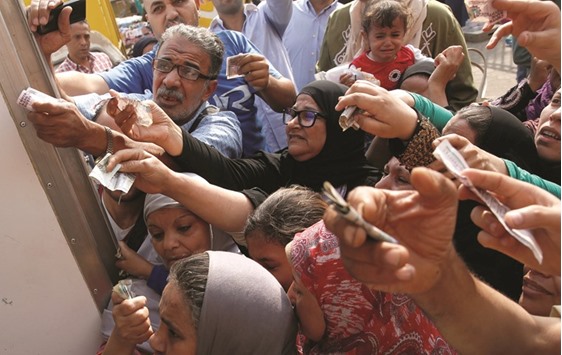Salama Faris is in demand these days, and that’s bad news for the Egyptian economy.
The bankruptcy lawyer has received a flurry of phone calls since authorities abandoned currency controls and raised energy prices in an effort to ease a dollar shortage crippling the economy. Some asked about the legal consequences of defaulting on liabilities. Others were concerned that surging costs may force them to shut companies.
“Everything is becoming more expensive and many businesses are struggling,” Faris said in an interview in Cairo.
The downturn that followed the floating of the pound is hardly a surprise - economists and officials agree that re-engineering an economy battered by five years of unrest will mean some pain. The longer it lasts, however, the greater the risk of social unrest in a country where economic suffering helped spark protests that toppled two presidents since 2011.
The government is overhauling a social contract in place since the 1950s, “one where citizens offer political acquiescence in return for what has been a welfare state,” said Yasser El-Shimy, a visiting fellow at European Council on Foreign Relations. Increasing hardship while avenues for protest remain blocked creates the potential for flashpoints, “the extent of which depends on how the government handles the situation,” he said.
The pound has weakened by about 50% since authorities took the decision to float the currency on November 3, part of a package of measures necessary to secure a $12bn loan from the International Monetary Fund. Some economists expect inflation, already near the highest level since at least 2009, to accelerate to as much as 20%.
Confectionery maker Edita Food Industries is raising prices, while cheese maker Domty said it expects a short-term slowdown. Some drug makers have halted production of price-controlled medicines.
Hassan Allam, chief executive of Hassan Allam Construction, said costs have risen 20% and can’t be passed on to existing contracts unless clients find a formula to share the burden. While his company is able to absorb the increase, he fears smaller builders will face bankruptcies. Construction employs about 12% of Egypt’s workforce, according to official statistics. “From a security and stability point of view, this is very serious,” Allam said in an interview. “What will happen if those people suddenly find themselves without work?”
Critics of President Abdel Fattah al-Sisi accuse him of mismanaging the economy since his election in 2013, claiming he’s focusing on mega-projects of doubtful benefits while failing to restore the stability needed to revive tourism.
Domestic demand is estimated to grow 3% this year - the second-slowest rate since the 2008 international financial crisis, according to Mohamed Abu Basha, a Cairo-based economist at EFG-Hermes. “The economy will have to slow down before it starts growing again,” he said.
Policy makers - and many economists - say difficult decisions had to be taken to reduce a spiralling budget deficit and restore the confidence of investors. The government has said the economy will grow by around 4% in the fiscal year through June.
So far, there are no signs of protests, though coverage of surging prices dominates the newspapers and influential night-time talk shows.
To compensate for the drop in consumption, authorities have devised a stimulus plan that allocates about 2% of gross domestic product for investments in the current budget, according to Deputy Finance Minister Ahmed Kouchouk. Last year’s stimulus was “much smaller,” he said. Gains from replacing imported goods with local products will also have a mitigating impact, he said.
Mohamed Kassem, head of Egypt’s ready-made clothes exporters council, already sees a sliver lining.
“Before the flotation there was a lot of chaos and uncertainty,” he said. “At least now we have a sense of direction.” Clothes exports may rebound 10% in 2017 after shrinking 16% this year, he said.
The projected economic growth, however, is barely sufficient to create employment for the estimated 500,000 annual entrants to the job market. And while it was tough to impose difficult reform measures, it will be “even tougher to keep it going,” Simon Williams, HSBC Holding’s chief economist for central and eastern Europe, the Middle East and North Africa, told Bloomberg Television.
“The weakening of the currency is not going to bring an early recovery in investments, it’s not going to bring an early pick up in exports or tourism,” he said. “The pain is going to have to be carried by domestic demand.”
Business activity fell to the lowest level in more than three years in November, contracting for a 14th month, according to the Emirates NBD Purchasing Managers Index for non-oil industries.
The slowdown will be reversed once investments start to flow and companies start to hire, leading wages to rise, Egyptian real estate businessman Samih Sawiris said on the sidelines of an investor conference in Cairo. For now, the slump cannot be avoided as “everyone in Egypt is now 30% or 40% poorer.”

Egyptians gather to buy subsidised sugar from a government truck after a sugar shortage in retail stores across the country in Cairo on October 14. The downturn that followed the floating of the pound is hardly a surprise; economists and officials agree that re-engineering an economy battered by five years of unrest will mean some pain.


